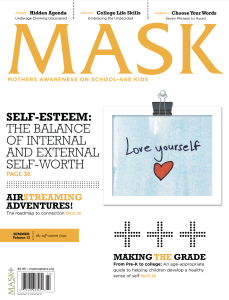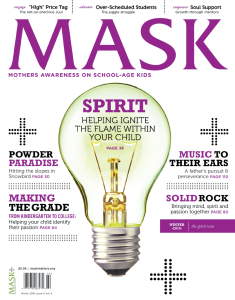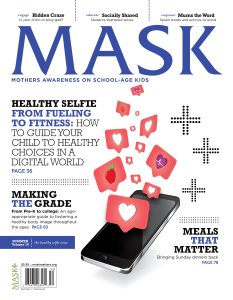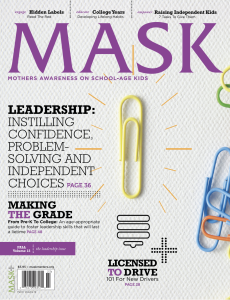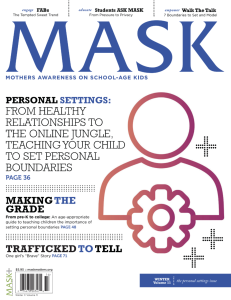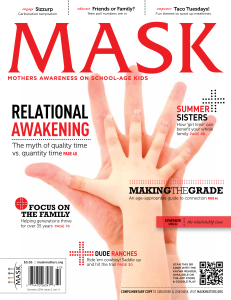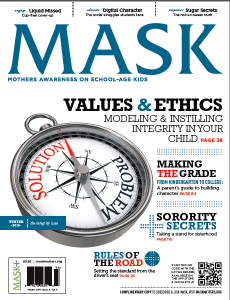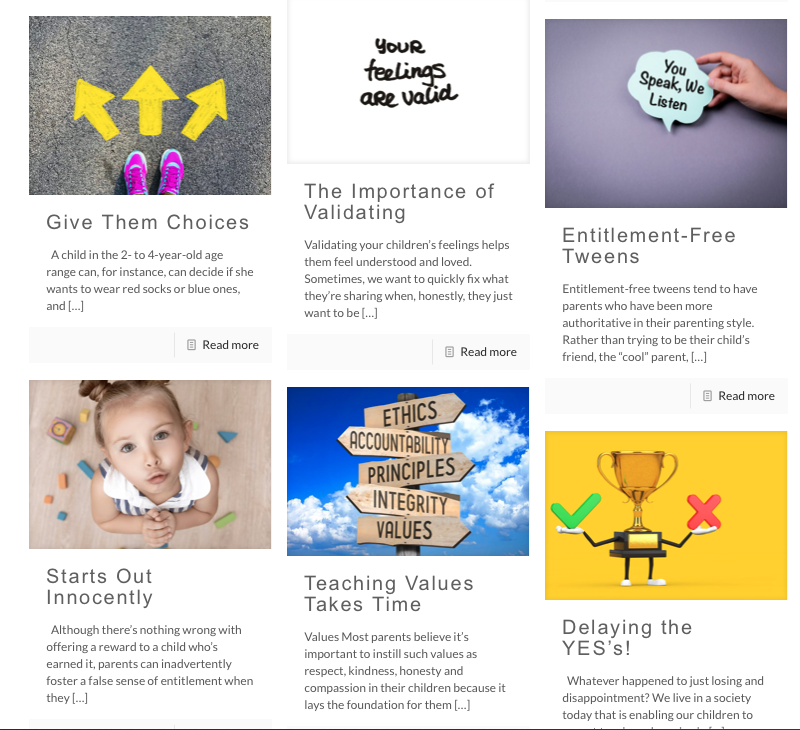
Magazines to Consider Adding to Your MASK Library
Self-esteem as a resilience factor helps us understand and re-think the concept of self-esteem. Self-esteem is defined as how you perceive yourself, meaning how you see and value yourself. Low self-esteem, meaning thinking and seeing yourself negatively, can result from a number of different reasons such as childhood abuse, bullying, racism, or poor relationships. High self-esteem can be the result of early positive relationships, getting support from others, consistent and authentic valuing from others, positive temperament, having the ability to regulate emotional experiences, and positive social experiences. When thinking about self-esteem as a resiliency factor, we are saying that people with a healthy self-esteem are able to tolerate distress, bounce back from negative experiences, and be adaptable and flexible. Children with high-self-esteem tend to take healthy risks, are not afraid of trying new things, and tend to experience positive social interactions.
Pre K
During this age, they are learning to explore more, learning to make friends and seek out opportunities for success. They are learning through modeling and trial and error which can make it hard for them to deal with failure. It is so important for them to learn how to deal with failure and frustration for healthy self-esteem to develop. They are starting to compare themselves to other and establish facts about their identity such as their favorite foods, which characters they like, and their color of their hair, eyes and skin. Healthy self-esteem emerges when they experience positive social comparison, are authentically validated for who they are and experience unconditional positive regard and love from their families and safe adults. Healthy self-esteem emerges in this age group when they deal with failure, are supported through distress, experience authentic acceptance, and are allowed to express their emotions.
- They will try new things
- They will say positive things about themselves
- They are proud of who they are and how they look
- They can tolerate frustration and seek support when overwhelmed
- They will express their feelings using basic feeling words
- They can tolerate losing
- They will express satisfaction in their efforts when they succeed
- They will ask for what they need
- Praise with authenticity and praise their efforts
- Explain that it is ok to lose
- Allow them to fail and lose – offer support when they are distressed
- Be consistent and set limits
- Offer them choices and opportunities for success
- Model healthy self-esteem
- Use positive reinforcement and praise to identify the specific behaviors they are engaging
- “Losing is a part of playing a game. It’s ok to feel upset about losing.”
- “I am so proud of how hard you worked on this project! What a great job!”
- “I love how you can see all the parts that make you who you are!”
- Spoon by Amy Rosenthal
- Thelma The Unicorn by Aaron Blabey
- There’s Only One You by Kathryn Heling
- I Love Me: Building Self-Esteem In Children
- HOW TO BUILD GOOD BEHAVIOR AND SELF-ESTEEM IN CHILDREN by Henry Schlinger
- The Conscious Parent’s Guide to Raising Boys: A mindful approach to raising a confident, resilient son * Promote self-esteem * Encourage positive … relationship (The Conscious Parent’s Guides) by Cheryl L Erwin
- My Happy Mind: Help Your Child Build Life-Long Confidence, Self-Esteem and Resilience by Laura Earnshaw
- Your Child’s Self-Esteem: Step-by-Step Guidelines for Raising Responsible, Productive, Happy Children by Dorothy Corkille Briggs
Elementary school
Your child is really starting to compare themselves to their peers at this stage. They are learning through trial and error, through observation and through independent exploration. They will respond well to authentic praise from others when younger but will start to transition to feeling good about their successes on their own as they get older. Kids in this age range also engage in social comparison – comparing themselves to others in terms of appearance and ability. Children can develop a negative self-esteem if they are engaging in comparison and find that they are not as good as someone else at specific tasks. It is very important to help them recognize their strengths and to give them the opportunities to demonstrate those strengths to avoid negative impacts of social comparison. Social media is another outlet for social comparison, so having early and frequent discussions about the role of social media as staying connected rather than using it for any other purpose is very important. Limiting access to social media is another strategy to use to help our children maintain an accurate self-perception.
- They express positive thoughts about themselves
- They try new things
- They see the good things they do
- They believe in themselves
- They can tolerate when things are hard or if they fail
- They are ok with making mistakes
- They can accept themselves as they are
- They identify their strengths
- They face challenges rather than avoid them
- Model healthy self-esteem
- Show your affection in healthy ways
- Authentically praise their strengths
- Try not to compare them to others
- Help them set appropriate and achievable goals
- Give them opportunities to show their strengths
- Focus on identifying effort and praising effort
- Encourage them to do new things
- Let them know it’s ok to make mistakes
- Encourage them to take breaks and go back to the task that is difficult
- “I saw how hard your worked on your project! I am so proud of you – I hope you see how well you worked on that project even though it was really hard.”
- “The people you see on tik tok or youtube are working – they get dressed up, use filters, and practice for hours before they post those short videos – remember that the stuff you see on these reels are not always real.”
- “What are the things you are good at? What are your strengths? Let’s find out together.”
- I Am Enough – by Grace Byers
- I Believe I Can – by Grace Byers
- Just Ask! Be Different, Be Brave, Be You – by Sonia Sotomayor
- Remarkably You by Pat Zietlow Miller
- Raising Happiness: 10 Simple Steps for More Joyful Kids and Happier Parents by Christine Carter Ph.D.
- Kid Confidence: Help Your Child Make Friends, Build Resilience, and Develop Real Self-Esteem by Eileen Kennedy-Moore
- Letting Go of Perfect: Empower Children to Overcome Perfectionism by Jill Adelson
- Help Your Child Feel Happier: 101 Ways to Boost Positivity and Self-Confidence by Caroline Roope
6-8 – Junior High
Self-esteem takes a big hit during the tween years as children transition from children to teenagers and into young adults. Girls tend to show higher self-esteem in 6th grade and lower self-esteem by 8th grade (Adames et. al., 2006). Boys tend to have higher self-esteem than girls in this age range, but their self-esteem also takes a dip between 6th and 8th grades. Their focus is on their role in the world and how they compare to others. Their social relationships outside the family become more salient and these friendships impact their self-esteem, personal sense of self-worth and how they see themselves fitting in to the world at large. The chances of developing negative outcomes such as depression, anxiety, self-injurious behaviors, substance use, and dissatisfaction with life is at higher risk during this stage of development. Parental support, positive peer support, and community involvement are critical during this stage to help them through this tough transition period.
- They say positive things about themselves
- They try new things
- They recover from feeling embarrassed
- They have positive peer relationships
- They have a positive body image
- They have realistic goals
- They feel a sense of belonging
- They can identify a sense of community
- They are excited about opportunities
- They are engaged in extracurricular activities that they choose
- Model healthy self-esteem
- Praise with authenticity
- Limit Social media use and have discussions about how this information is not necessarily authentic
- Talk to them about resiliency, self-esteem and the importance of keeping a positive sense of self
- Identify authentic strengths
- Focus on effort not outcome
- Help them set realistic goals
- Give them opportunities to demonstrate success
- Teach them about the importance of feeling good about themselves
- Help them get engaged with the community
Conversation Starters:
-
- “It’s can be hard to feel good about yourself when you compare yourself to what you see on tik tok or youtube. What are your strengths and what makes you feel good about yourself?”
- “You are going to have a lot of intense ups and downs for the next couple of years. How do you stay positive about yourself while dealing with some of these struggles?”
- “I love how hard you always work – I see you put your heart and soul into the things you love. I hope you see how amazing you are.”
- The Skin I’m In (20th Anniversary Edition) by Sharon Flake
- Just As You Are: A Teen’s Guide to Self-Acceptance and Lasting Self-Esteem (The Instant Help Solutions Series) by Michelle Skeen
- Dad’s Great Advice for Teens: Stuff Every Teen Needs to Know About Parents, Friends, Social Media, Drinking, Dating, Relationships, and Finding Happiness by Marc Fienberg
- You Don’t Have to Be Everything: Poems for Girls Becoming Themselves by Diana Whitney
- 501 Ways to Boost Your Child’s Self-Esteem by Robert Ramsey
- Social Media Wellness: Helping Tweens and Teens Thrive in an Unbalanced Digital World (Corwin Teaching Essentials) by Ana Homayoun
- Queen Bees and Wannabes, 3rd Edition by Rosalind Wiseman
- DEAR EVAN HANSEN by Val Emmich
High School
This is a time of significant development and preparation to launch into young adulthood. They are coping with independence, more work, and time management. These challenges are successfully met when your kids feel good about themselves, feel supported at home, and feel engaged with others outside the home. Physical health including healthy diet, exercise and good sleep are really important during this age. Their outlook on themselves and the world is fueled by self-perception, how they fit in, and their developing values. They are going to be able to identify strengths and areas of growth, so it is important to talk with them often about how they see themselves and how they feel about themselves. They are going to engage in social comparison and compare both upwards and downwards. Talk to them about these comparisons and how they feel about who they are. Help them develop a healthy sense of body image by focusing on health and wellness. Being the supportive base continues to be the most important thing a parent/caregiver can do for high school aged kids in terms of helping to maintain healthy self-esteem.
- They may engage in social comparison, but it does not negatively impact their self-esteem
- They have a healthy body image
- They are able to identify strengths
- They have a positive sense of body image
- They are ready to try new things and face challenges
- They have positive peer relationships
- They seek support when they are upset
- Model healthy self-esteem
- Talk about image – discuss healthy and accurate body image
- Talk about social comparison and why/how it happens and how it can affect them
- Discuss the role of social media and images they see and the artificial nature of these types of posts
- Help them maintain healthy physical habits in terms of eating, sleeping and activity
- Talk to them about healthy and realistic goal setting
- Give them and join them in opportunities to get active in the community
- Check in with them about their self-image, sense of self, and self-esteem
- “It’s still ok to talk to me about anything you have questions or worries about. If you are feeling down on yourself, let me know – how you feel about yourself is huge and so important.”
- “When you see videos, posts, and pics of these people who “look” perfect, remember that they are using filters and all sorts of tech to change how they look. This is not based in reality!”
- “How are you feeling about yourself lately? So much keeps changing and you have so much going on, I want to check in with you.”
- The Self-Esteem Workbook for Teens by Lisa M. Schab
- The 7 Habits of Highly Effective Teens Workbook by Sean Covey
- Chicken Soup for the Soul: Teens Talk Growing Up: Stories about Growing Up, Meeting Challenges, and Learning from Life by Jack Canfield
- You Are Awesome: How to Navigate Change, Wrestle with Failure, and Live an Intentional Life by Neil Pasricha
- The Power of Self-Kindness: How to Transform Your Relationship with Your Inner Critic by Hannah BraimeGood Enough: The Myth of Success and How to Celebrate the Joy in Average by Eleanor Ross
- Daring Greatly: How the Courage to Be Vulnerable Transforms the Way We Live, Love, Parent, and Lead by Brené Brown
- Permission to Feel: Unlocking the Power of Emotions to Help Our Kids, Ourselves, and Our Society Thrive by Marc Brackett
- What’s Right with Me: Positive Ways to Celebrate Your Strengths, Build Self-Esteem, and Reach Your Potential by Carlene DeRoo
College
Self-esteem is shaped by their values, experiences, thoughts, and relationships – So as your college-aged child is getting ready to launch from home, it is so important to assess where there are at with regards to self-esteem. Check in with them often. Have conversations about successes, failures, and their level of self-esteem. Remind them to check-in with themselves about how they see themselves, how they are engaging in social comparison, and how they are fitting into their new place in the world. It’s so important to talk with them and listen to their experiences. Keep your eyes and ears open for signs of low self-worth, depression, anxiety, or feelings/thoughts about suicide. Young adults at this age are susceptible to developing mental health diagnoses and suicidal ideation within the context of stress, changes, and not having enough resources to handle the situation. Identifying signs of low self-esteem early on can help them better understand themselves and can clue them into learning how to build their sense of self, self-worth, and self-esteem.
- They have a balanced view of themselves
- They bounce back from failure
- They recognize their strengths and areas of growth
- They are not intimidated by challenges
- They do not embarrass easily
- They have a good opinion of themselves
- They maintain healthy freindships
- They do not fall to peer pressure
- They have a good sense of identity and values
- They are able to say no
- They are engaged with their community
- They have a sense of belonging
- Model healthy self-esteem
- Talk with them about how they feel about themselves
- Check in with them and listen for cues of low self-esteem
- See how they are doing with work/school/relaxing time balance
- Check in about their health and wellness
- Talk about feeling good about yourself
- Ask them about successes and celebrate their efforts
- Offer authentic praise for effort
- “How are you feeling as you deal with all the changes? How are you feeling about yourself?”
- “What are your strengths? What do you know you are good at?”
- “Have you been feeling sad, anxious or having thoughts about completing suicide? Are you taking care of yourself and making time for rest to take care of yourself?”
- SELF-ESTEEM, SELF-IMAGE, SELF-WORTH: Overcoming Feelings of Being “LESS THAN” by Mitchell Deutsch (?)
- Revolution from Within by Gloria Steinem
- The Confidence Gap: A Guide to Overcoming Fear and Self-Doubt by Russ Harris
- You’ve Got This!: The Life-changing Power of Trusting Yourself by Margie Warrell
- The Self Confidence Workbook by Barbara Markway
- The Six Pillars of Self-Esteem: The Definitive Work on Self-Esteem by the Leading Pioneer in the Field by Nathaniel Branden
- Big Magic: Creative Living Beyond Fear by Elizabeth Gilbert
- The Power of Self-Esteem: An Inspiring Look At Our Most Important Psychological Resource by Nathaniel Branden

